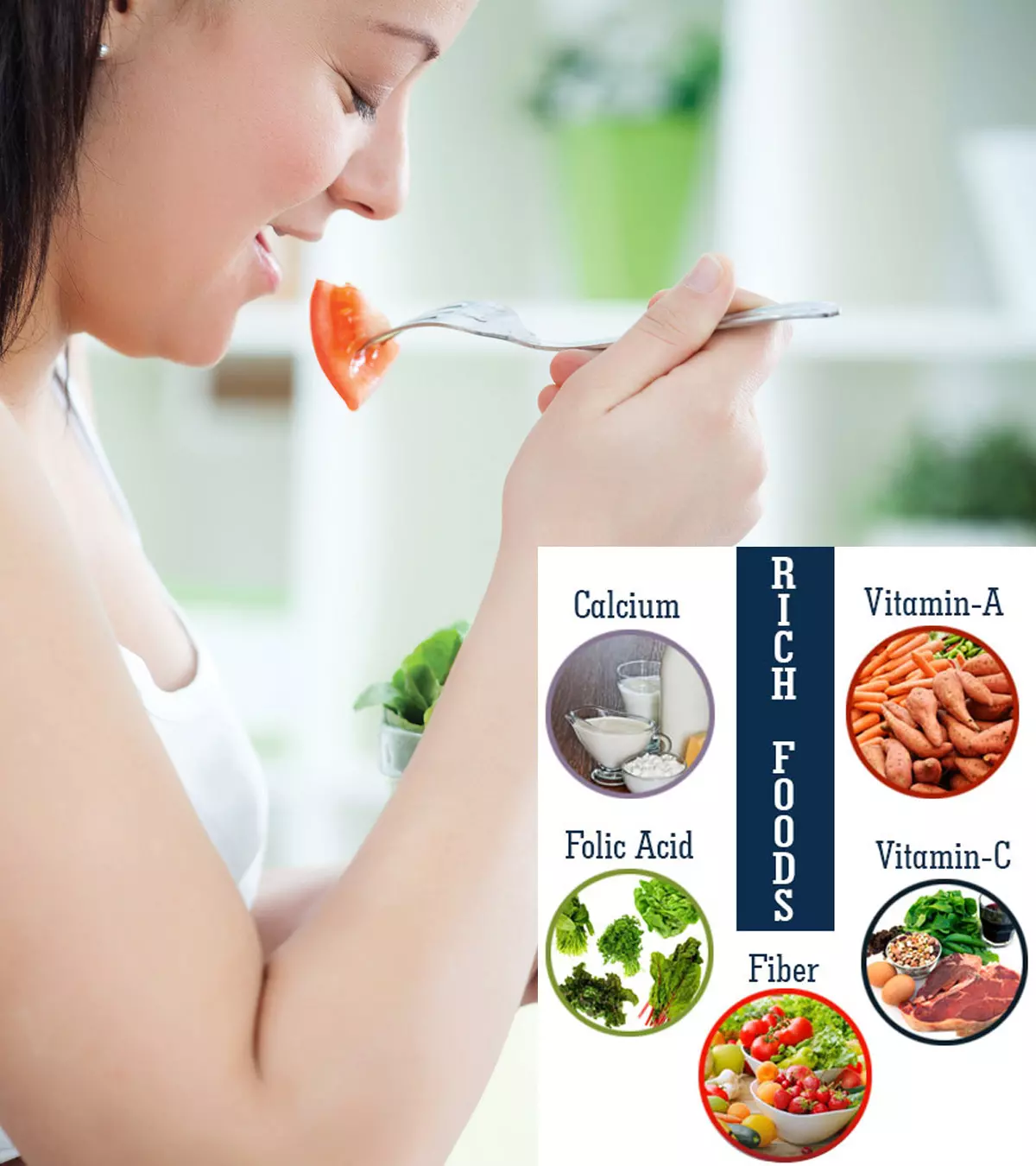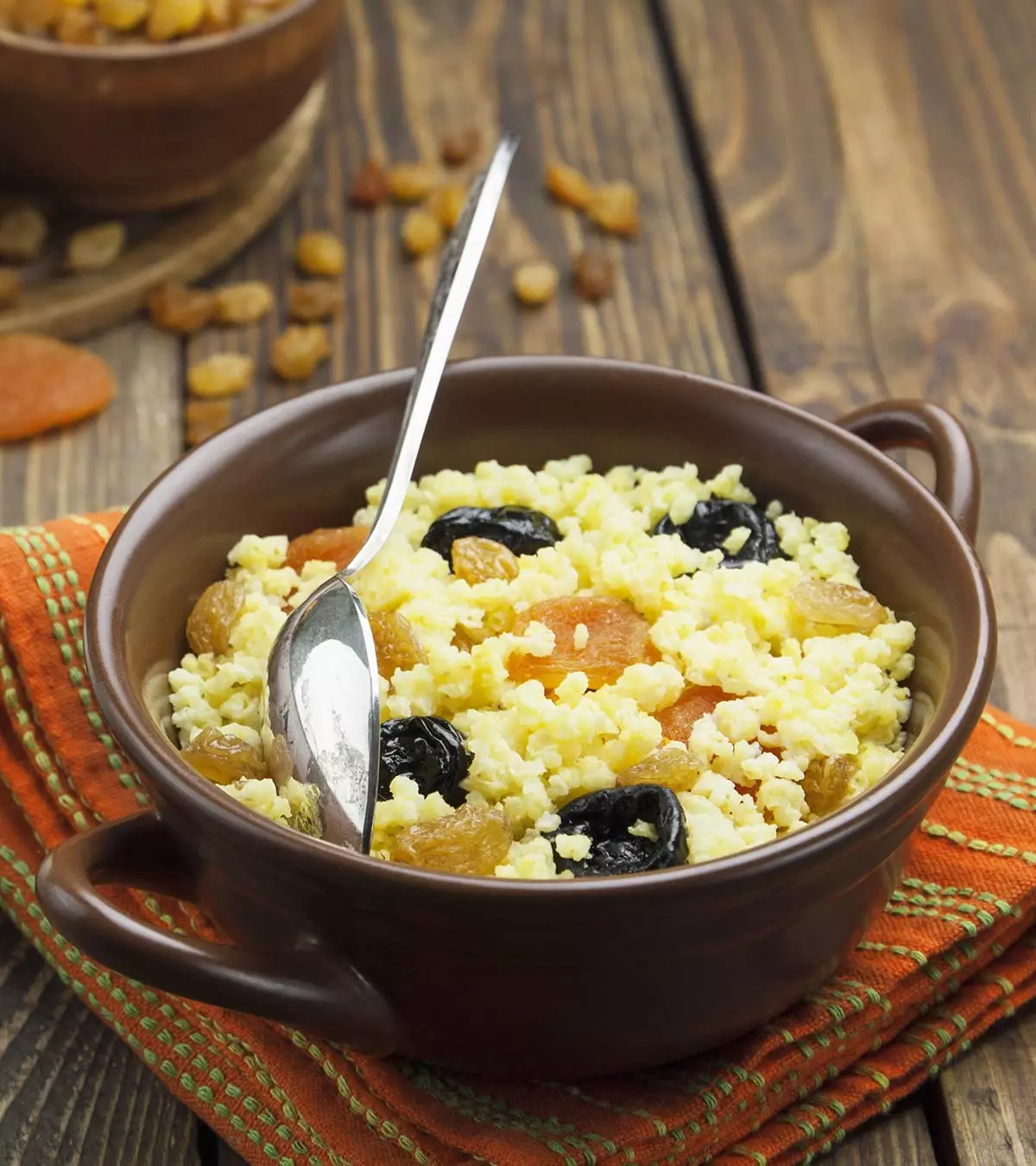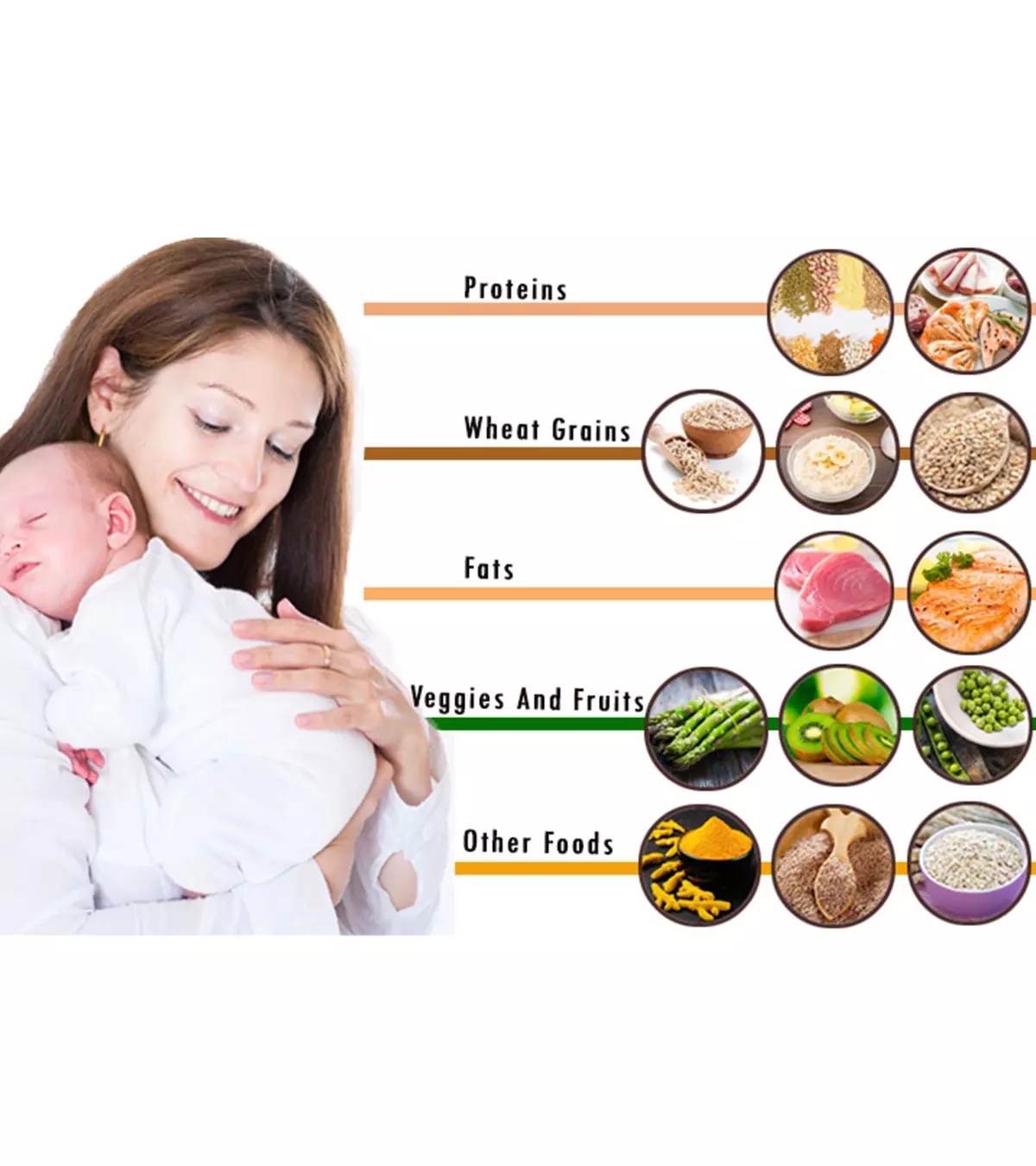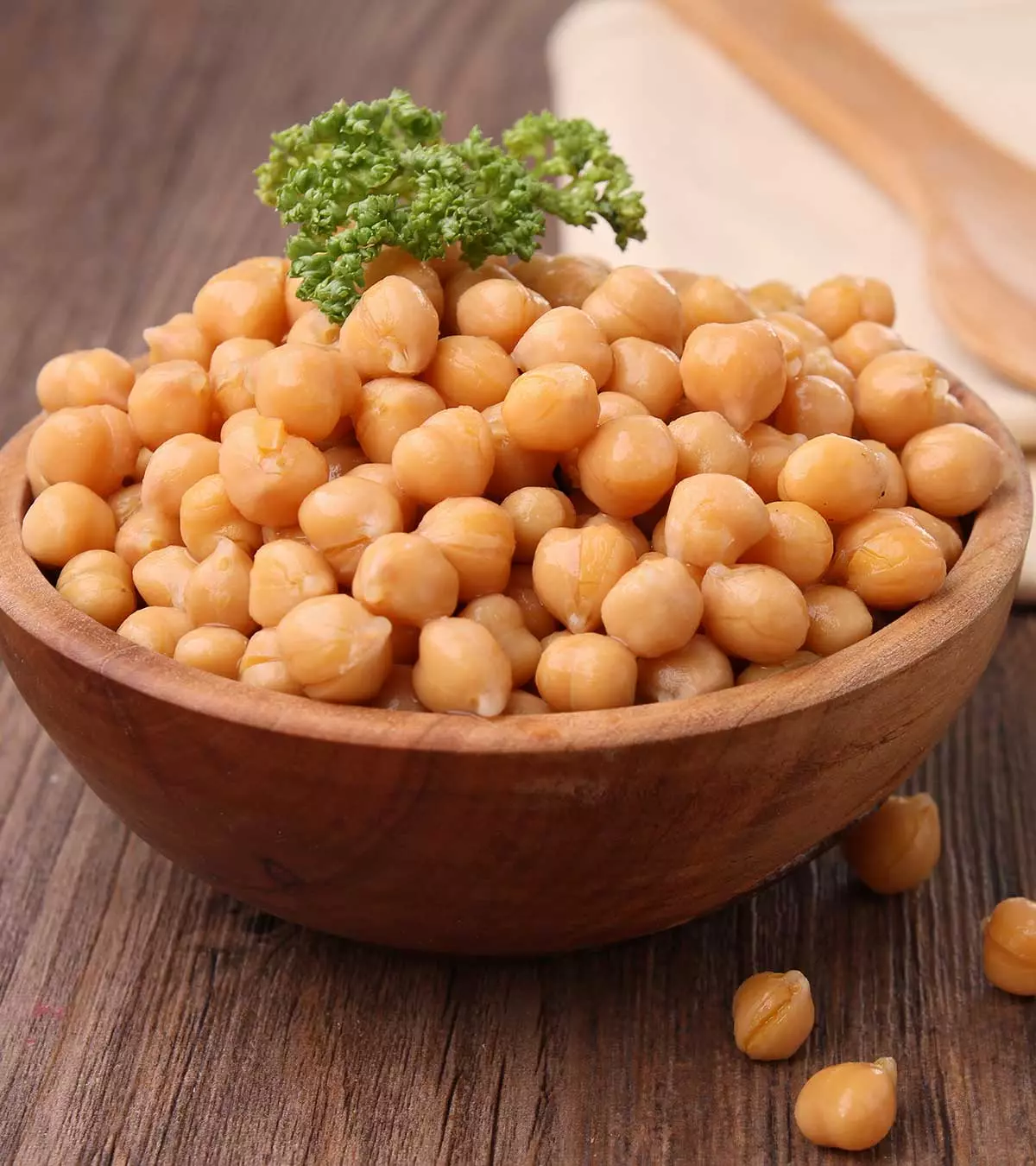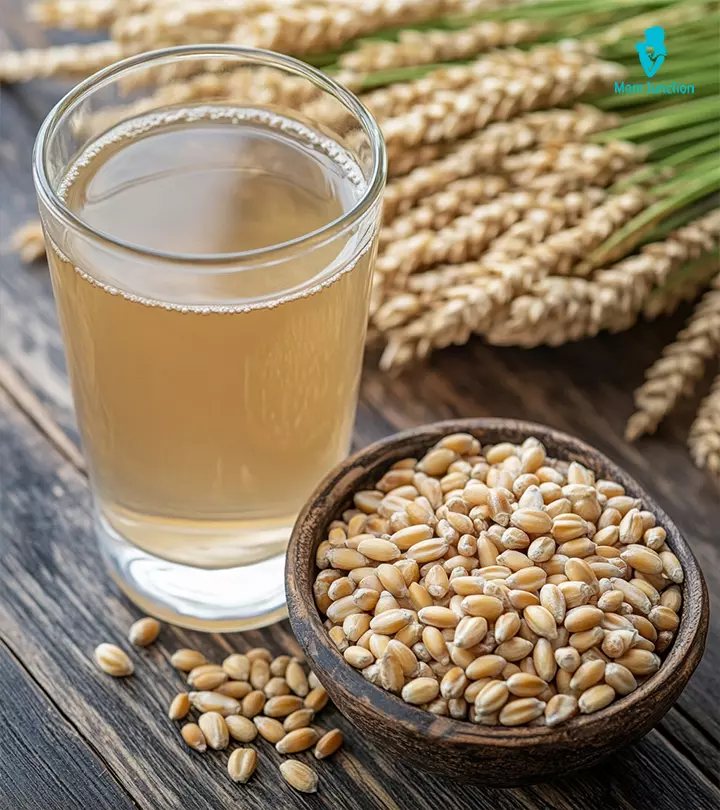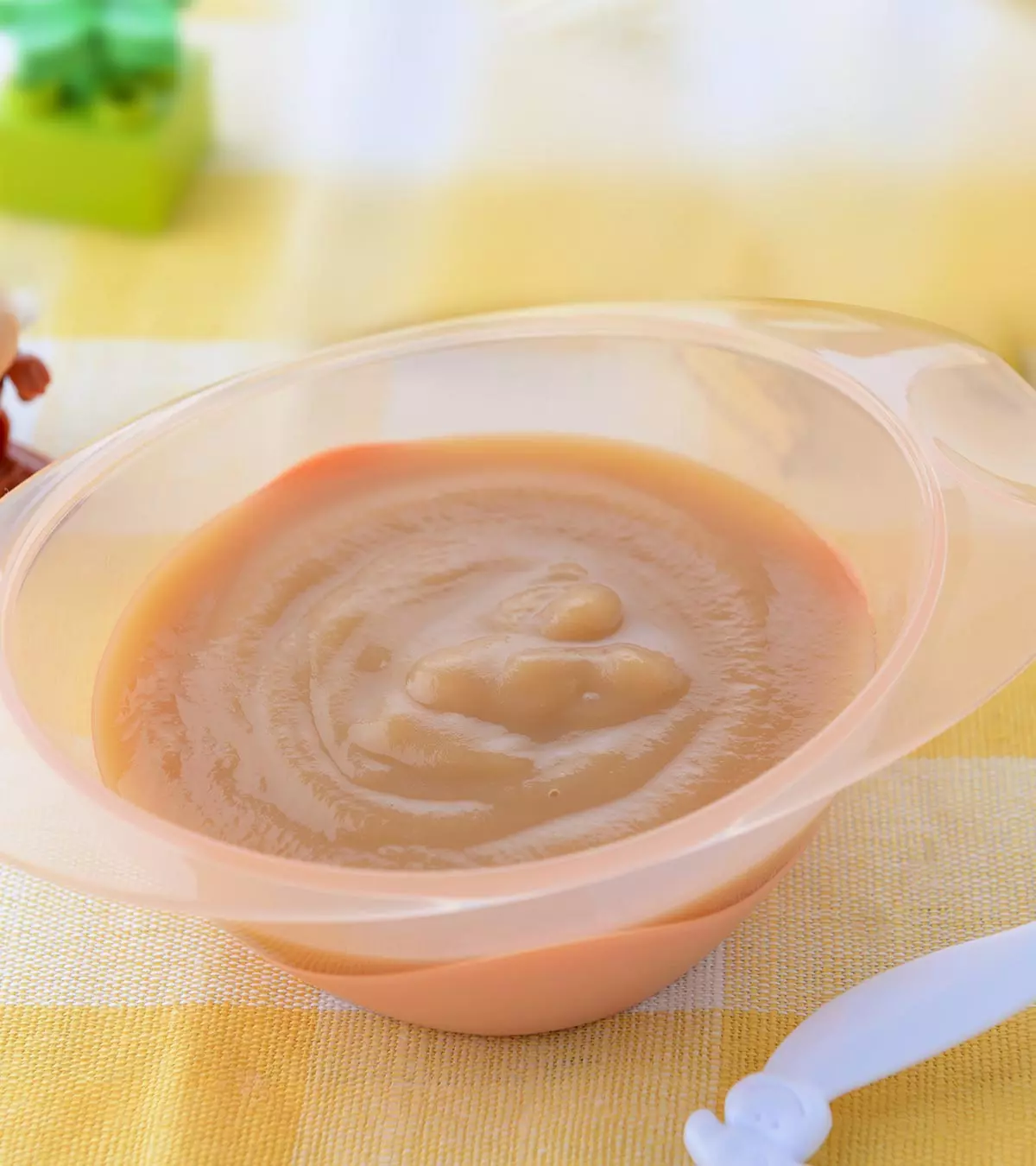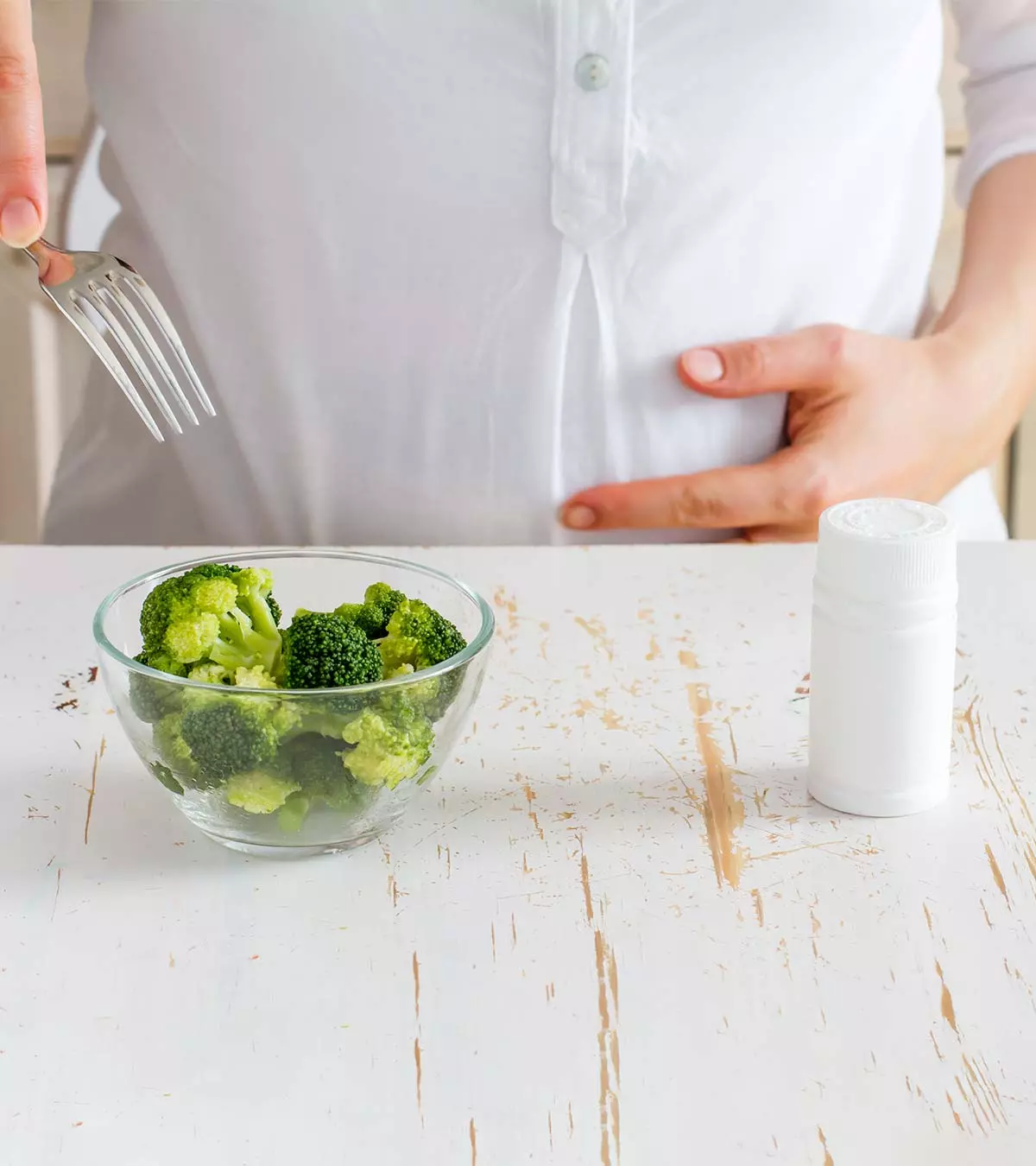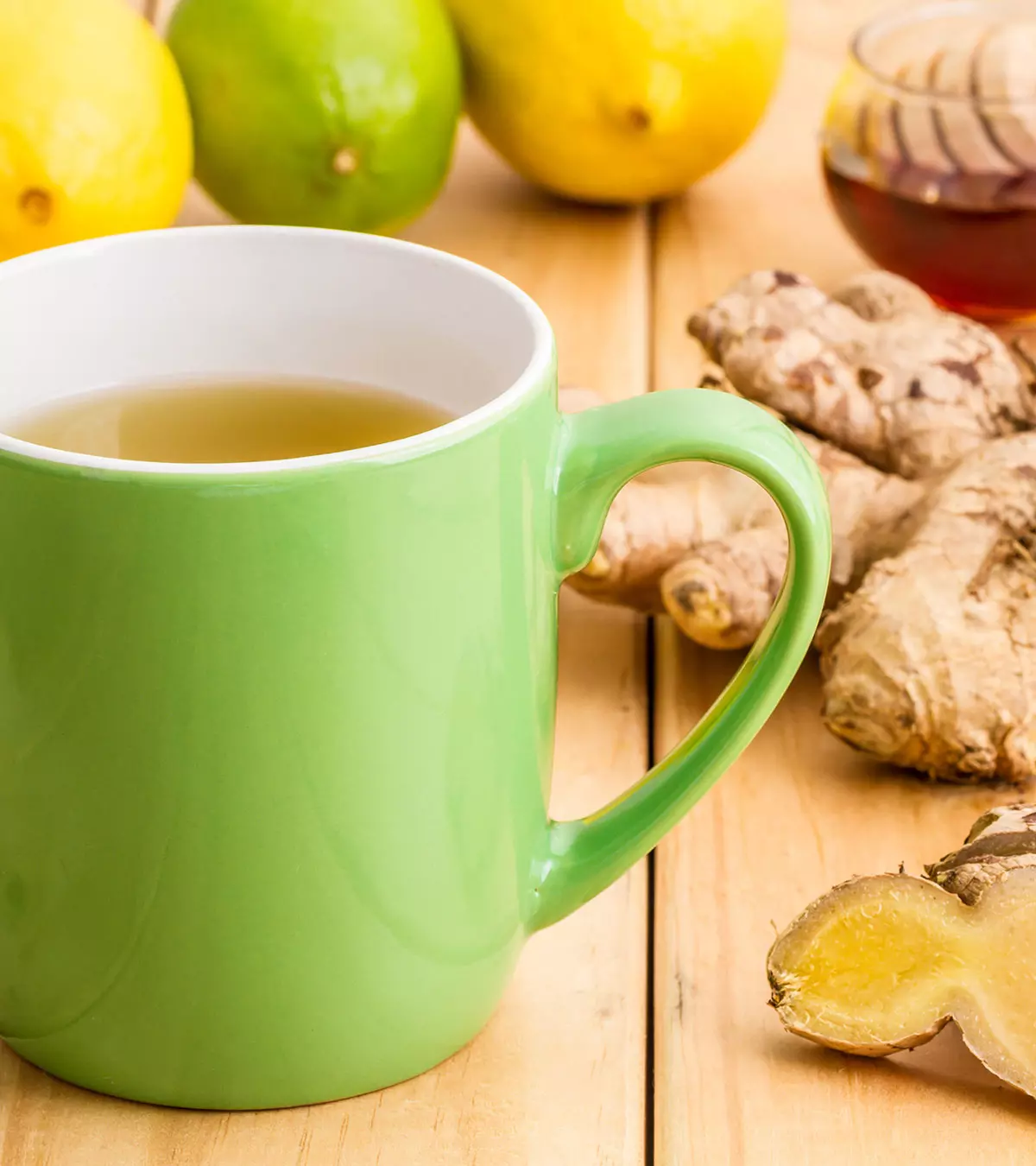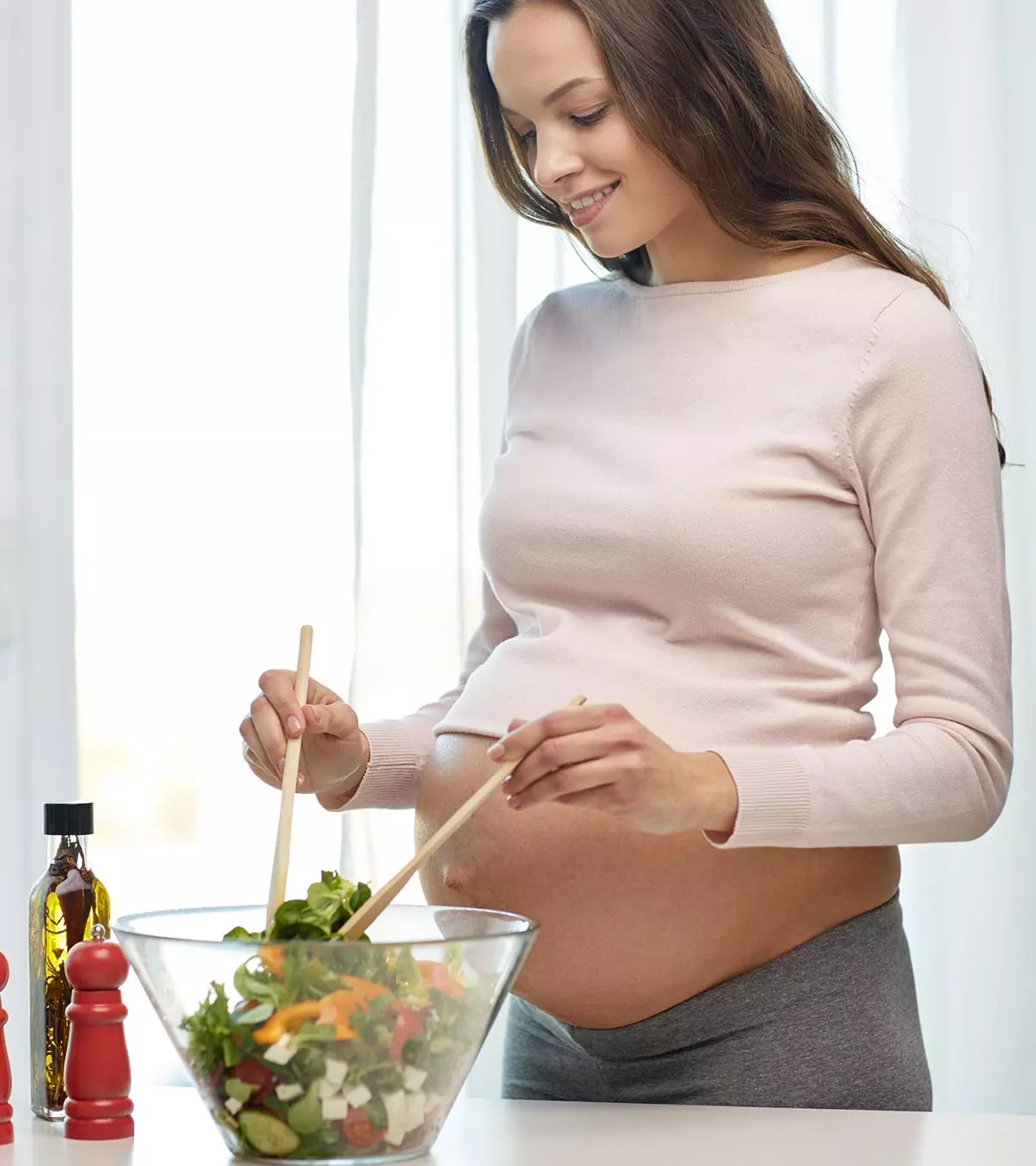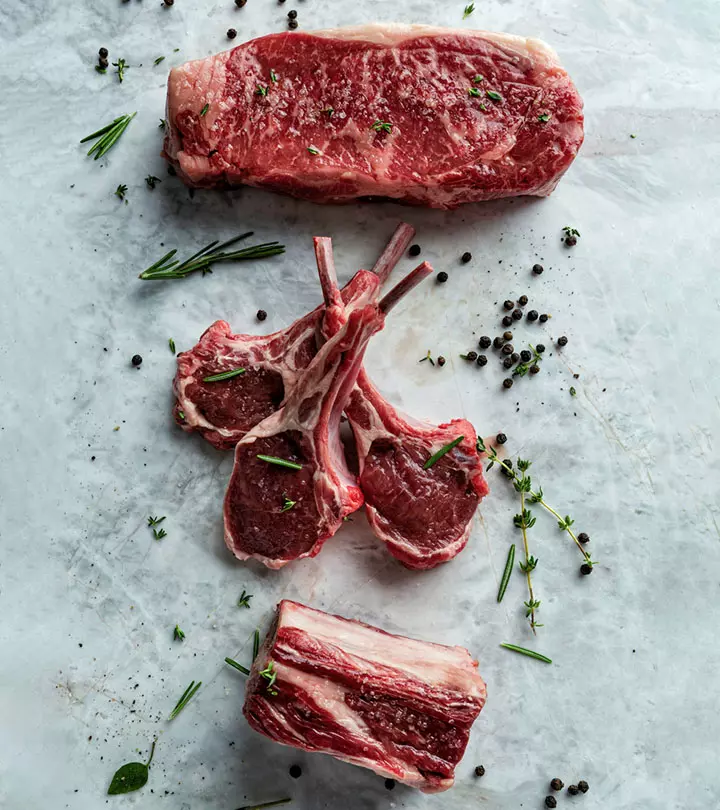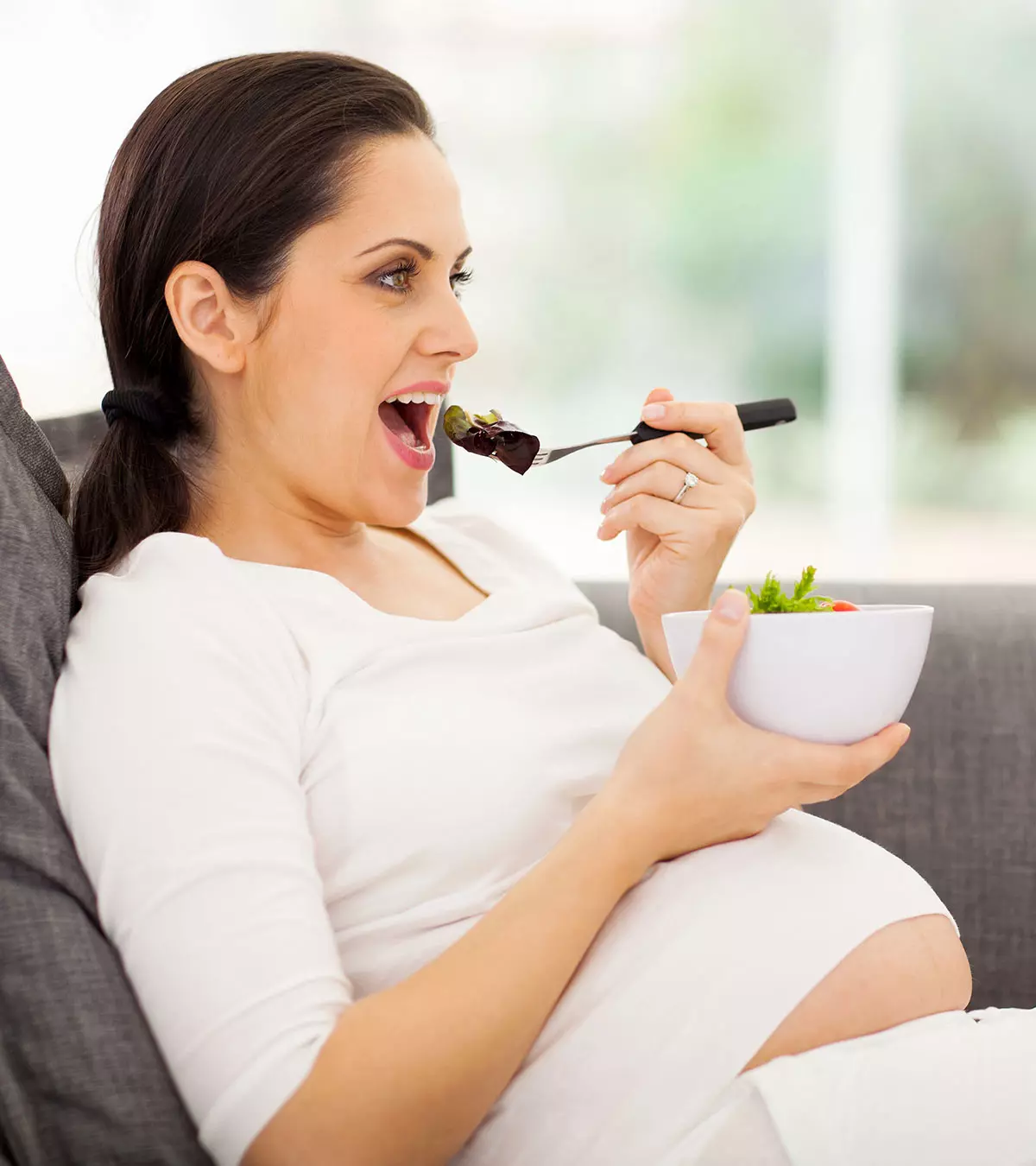
Image: Shutterstock
When you’re pregnant, what you eat may directly influence fetal growth and development. Therefore, your doctor may suggest you eat some nutrition-rich foods more while completely avoiding other foods. However, some foods are tricky; for example, eating liver during pregnancy may have both beneficial and negative impacts on fetal development.

Although the liver is a good source of many essential nutrients, consuming it in excess may have negative consequences.
This post tells you the ways and forms in which the liver is consumed and the benefits and negative impacts of consuming the liver during pregnancy.
Key Pointers
- Liver is a rich source of folic acid and essential nutrients that are beneficial during pregnancy.
- Consuming excessive quantities of the liver during pregnancy might increase the risks of problems associated with the baby’s nervous system.
- It is also advised to avoid other food sources that might contain liver, such as cod oil or liver sauces and spreads.
- Consult with a healthcare professional to learn about proper liver intake amount during pregnancy.
Forms Of Liver
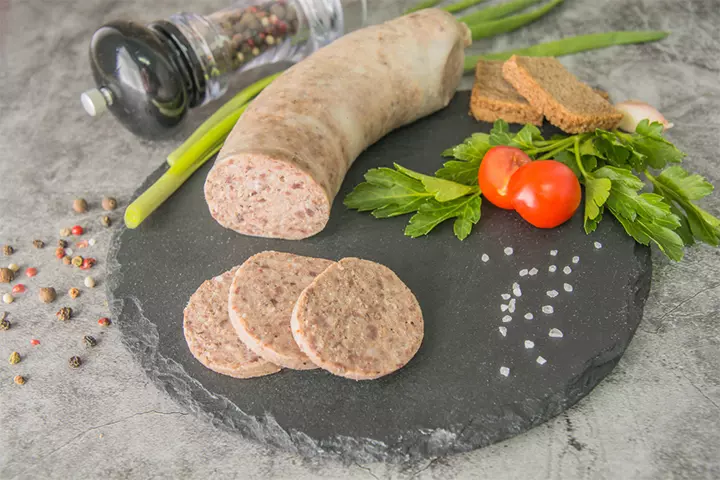
The liver is eaten in many forms in different parts of the world:
- Liver pâté
- Chopped liver
- Liver sausage
Whatever be the form of the liver that you are consuming, the impact is almost the same. Some difference lies in the source from where the liver is coming.
 Point to consider
Point to considerBenefits Of Eating Liver During Pregnancy
The liver has many nutrients that are good for maternal health as well as fetal health. It contains (1) (2) (3) (4):
- Iron: Supports the delivery of oxygen to the fetus through red blood cells.
- Vitamin A: Aids in the development of healthy skin and vision in the fetus.
- Protein: Promotes the growth and development of the fetus.
- B vitamins: The liver is a good source of B vitamins, particularly:
- Vitamin B2 (Riboflavin): Supports good vision, healthy skin, and the development of the baby’s bones, muscles, and nerves.
- Vitamin B9 (Folate): Helps prevent congenital abnormalities.
- Vitamin B12 (Cobalamin): Helps prevent spinal and central nervous system birth defects, such as spina bifida.
According to gynecologist & obstetrician Dr. Nisarg Patel, “The liver can be healthy for the baby if consumed in moderation and cooked thoroughly. The liver can provide essential nutrients such as protein, iron, folic acid, zinc, copper, and vitamin B12. These nutrients can support the baby’s brain, immune system, and metabolism.”
While protein and folic acid are important for supporting your baby’s growth, iron ensures the formation of adequate hemoglobin in the blood. It is the Vitamin A part that may cause problems.
Tai Dinnan, a Gardens Coordinator and Consultant shared how the liver was one of the foods that benefited her during pregnancy. She says, “ Though it is hard to prove, I do think that my diet contributed to the easy conception, a comfortable pregnancy, labor and delivery without complication, and a strong healthy baby…I ate to fullness, following my own body’s cues), but I did make sure to have liver and sardines (with bones and skin) once a week; soaked or sprouted my grains, beans, and nuts; and ate grass-fed butter, pastured meat, raw milk, bone broth, eggs, fermented foods, and organic produce pretty much every day (i).”
Negatives Of Eating Liver During Pregnancy
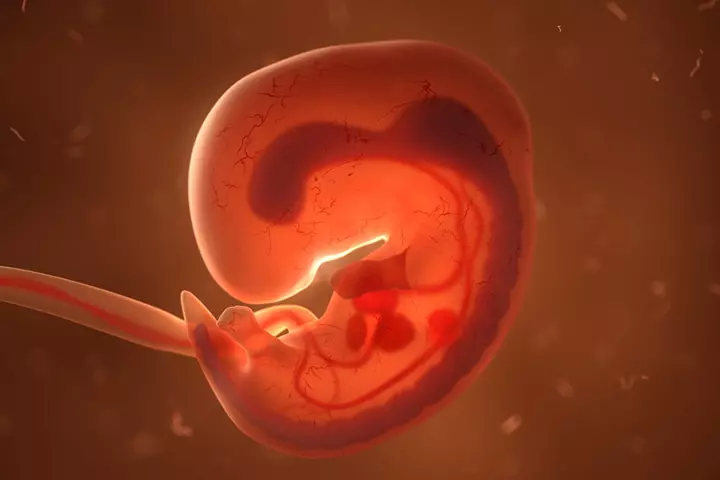
The liver contains the most concentrated form of Vitamin A (1)(5). The exact amount found in various sources will differ. For example, beef liver will have a higher degree of Vitamin A than chicken liver (6). Consuming liver during pregnancy, even in small quantities, could be harmful due to its high retinol content.
- Excessive intake of vitamin A during pregnancy in this form can lead to congenital disabilitiesiPhysical abnormalities existing right from birth or birth defects (7).
- The defects can be in the form of mutationsiThe alteration of the structure or sequence of genes which may result in a changed phenotype and can even lead to the development of cancerous cells. According to reports released by the Centers for Disease Control and Prevention (CDC), in the US, about one in every 33, which translates to about 120,000 babies, are born with birth defects annually (8).
- The teratogeniciAny substance, condition, or exposure that can disturb the development of a fetus and cause birth defects when a pregnant person is exposed to it. effects of high vitamin A intake include exencephalyiA condition where parts of the brain develop outside the skull. , cleft lipiA birth defect characterized by a split or opening in the upper lip. and/or palate, and various eye defects (9).
- The Royal College of Obstetricians and Gynecologists (RCOG), Advises against eating liver and liver products. The report states, “It is rare for women in developed countries like the UK to be deficient in vitamin A, so you should avoid eating foods such as liver and liver products like pâté (10).”
- Moreover, the liver is also high in cholesterol, which is unhealthy for pregnant and non-pregnant people.
 Caution
CautionHow Much To Consume?
There is no clear evidence that prescribes a certain quantity of liver that can be consumed while you are pregnant. So, it all depends on your personal judgment. However, avoiding it will be the best course of action due to higher concentrations of vitamin A which is a fat soluble vitamin and its excess quantity doesn’t get excreted easily. You can have other forms of vitamin A which are safer (11) (12).
The National Research Council recommends a dietary allowance of 1,000 retinol equivalents (RE)/day, which is equivalent to 3,300 IU as retinol or 5,000 IU of vitamin A obtained from a typical diet that includes both retinol and carotenoids (e.g., beta-carotene) (9). Women who take a higher amount are at risk of facing birth defects and complications.
What To Avoid?
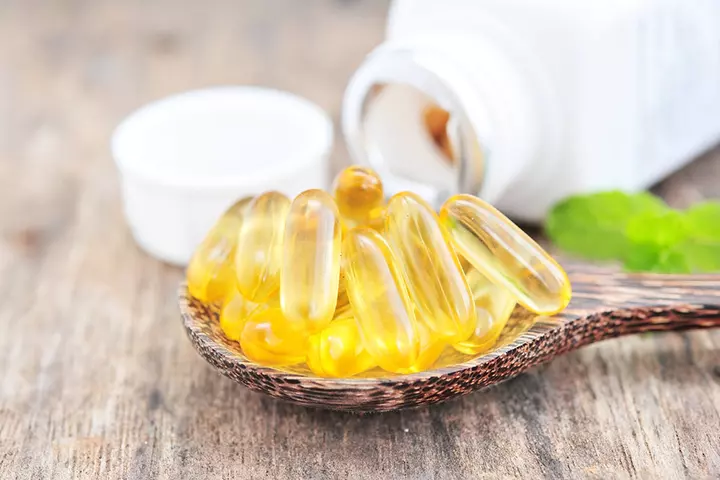
When you are abstaining from having liver, you must also try and stay away from these products:
- Spreads or sauces that contain traces of the liver.
- Supplements having Cod liver oil or shark liver oil (13).
- Medicines or supplements which have a high concentration of Vitamin A in the retinol form.
- Skin care products that have retinol as a component.
Other Sources Of Vitamin A
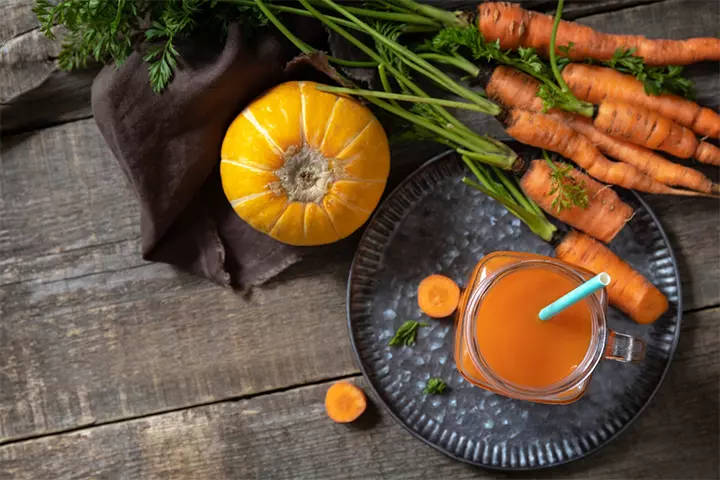
Now that you know about the ill effects of eating liver, you need to find some alternative sources of Vitamin A that are good for your baby’s development. Some of them can be (13):
- Carrots
- Sweet potatoes
- Pumpkin
- Spinach
- Collards
- Kale
- Turnip Greens
- Beet Greens
- Red peppers
- Mango
- Papaya
- Apricots
- Cheese
- Egg
- Oily fish
These sources are great for building good vision and immunity and act as effective antioxidants. The best part is that Vitamin A in these vegetables is in the form of beta carotene, which is good for your body and can be easily introduced to your maternal diet.
Frequently Asked Questions
1. Does beef liver have folate?
Yes, 100g raw beef liver contains around 290µg of folate (14).
2. Is liver sausage or chopped liver safe in pregnancy?
The NHS recommends that pregnant women avoid consuming any food containing liver and liver products (15).
3. How can I safely buy and prepare liver during pregnancy?
If your healthcare provider approves eating liver during pregnancy, ensure you buy fresh liver with a bright color and smooth texture from reputed stores, avoiding the ones with yellow color. Store it in the refrigerator immediately, and maintain hygiene by washing your hands before and after handling it. Keep raw liver separate from other foods and cook it thoroughly to an internal temperature of 165°F (74°C), ensuring no pink parts remain. Never eat raw or undercooked liver during pregnancy to avoid the risk of harmful bacteria or parasites (16).
You should be wary of foods to eat during pregnancy since those foods will affect your unborn baby, too. Liver consumption during pregnancy can be beneficial since it is a protein, folic acid, and iron rich food. However, the liver also contains high amounts of vitamin A in the form of retinol, which may increase the risk of congenital abnormalities. Hence, some doctors recommend against consuming liver and liver products such as cod liver oil supplements and sauces containing liver. Instead, foods like carrots, pumpkin, spinach, etc., can be added in a diet chart for pregnant women for a healthy dose of vitamin A. However, if you are craving liver during pregnancy, consult your gynecologist to know if you can safely consume it and add it in your balanced diet.
Infographic: Vegetarian Alternatives To Liver And Meat
Although you enjoy eating liver during pregnancy, there may be moments when you may not crave it. During such situations, you may consider the following vegetarian options packed with a lot of nourishment. Check out this infographic that will help you with some vegetarian alternatives for liver or meat. Illustration: Momjunction Design Team
Illustration: Is It Safe Eating Liver During Pregnancy?
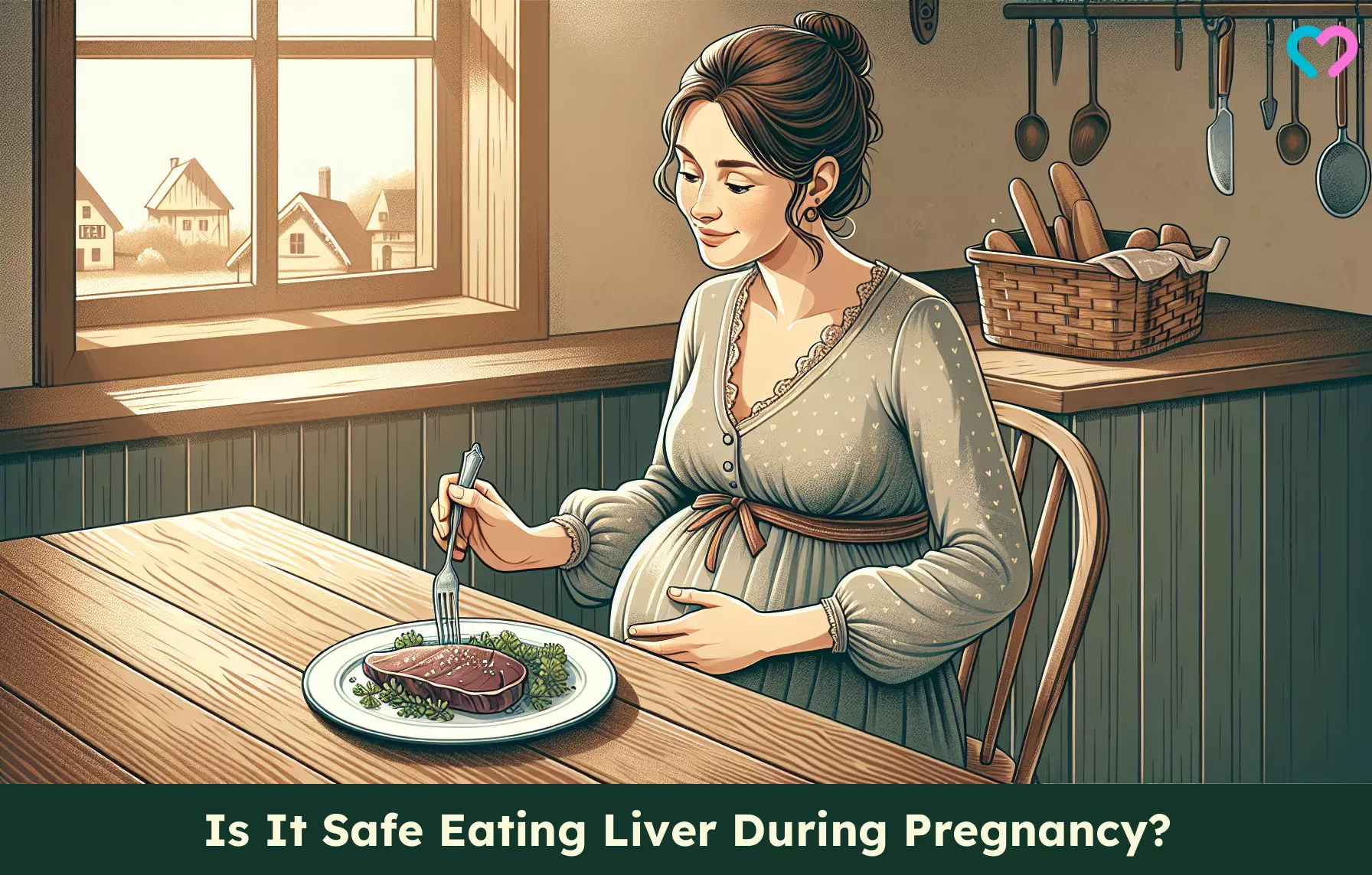
Image: Dall·E/MomJunction Design Team
Personal Experience: Source
MomJunction articles include first-hand experiences to provide you with better insights through real-life narratives. Here are the sources of personal accounts referenced in this article.
i. Favorite Pregnancy Books and Resources.https://growingstories.wordpress.com/2018/04/28/favorite-pregnancy-books-and-resources/
References:
- The Liver Files.
https://www.westonaprice.org/health-topics/food-features/the-liver-files/ - Nutrition During Pregnancy.
https://www.acog.org/womens-health/faqs/nutrition-during-pregnancy - Is Beef Liver Good for You?
https://health.clevelandclinic.org/beef-liver-benefits - Variety Meats.
https://www.asi.k-state.edu/doc/meat-science/variety-meats.pdf - Vitamin A.
https://www.ncbi.nlm.nih.gov/books/NBK548165/ - L C Howells and C T Livesey; (1998); A survey of vitamin A concentrations in the liver of food-producing animals.
https://pubmed.ncbi.nlm.nih.gov/9534868/ - Raegan B Abadie et.al; (2025); Vitamin A-Mediated Birth Defects: A Narrative Review.
https://pmc.ncbi.nlm.nih.gov/articles/PMC10788247/ - About Birth Defects.
https://www.cdc.gov/birth-defects/about/index.html - Recommendations For Vitamin A Use During Pregnancy.
https://birthdefectsresearch.org/pubs/vitamina.asp - Healthy eating and vitamin supplements in pregnancy.
https://www.rcog.org.uk/for-the-public/browse-our-patient-information/healthy-eating-and-vitamin-supplements-in-pregnancy/ - R Sharma and S Desai; (1992); Vitamin A in pregnancy: a review
https://pubmed.ncbi.nlm.nih.gov/12288485/#:~:text=The%20International%20Vitamin%20A%20Consultative - Vitamin A.
https://www.nhs.uk/conditions/vitamins-and-minerals/vitamin-a/ - Omega-3 Fatty Acids.
https://extension.colostate.edu/topic-areas/nutrition-food-safety-health/omega-3-fatty-acids-9-382/ - Beef, variety meats and by-products, liver, raw.
https://fdc.nal.usda.gov/fdc-app.html#/food-details/169451/nutrients - Foods to avoid in pregnancy.
https://www.nhs.uk/pregnancy/keeping-well/foods-to-avoid/ - Liver and other offal.
https://www.quebec.ca/en/health/nutrition/food-safety-risk-prevention/food-safety/preparing-cooking-food-safely/cooking-internal-temperatures/liver-other-offal - Eating in pregnancy and after birth.
https://www.nct.org.uk/information/pregnancy/body-pregnancy/eating-pregnancy-and-after-birth#:~:text=%22Don’t%20eat%20liver%20or,%3B%20NHS%20Choices%2C%202017a
Community Experiences
Join the conversation and become a part of our nurturing community! Share your stories, experiences, and insights to connect with fellow parents.
Read full bio of Priyanka Sagar
- Dr. Nisarg Patel is a gynecologist, obstetrician, and laparoscopic surgeon from Ahmedabad, India, with over 13 years of experience in the field. He did his post graduation in Obstetrics and Gynecology from Pravara Institute of Medical Sciences, Ahmednagar, and holds a fellowship of Reproductive Medicine.
 Dr. Nisarg Patel is a gynecologist, obstetrician, and laparoscopic surgeon from Ahmedabad, India, with over 13 years of experience in the field. He did his post graduation in Obstetrics and Gynecology from Pravara Institute of Medical Sciences, Ahmednagar, and holds a fellowship of Reproductive Medicine.
Dr. Nisarg Patel is a gynecologist, obstetrician, and laparoscopic surgeon from Ahmedabad, India, with over 13 years of experience in the field. He did his post graduation in Obstetrics and Gynecology from Pravara Institute of Medical Sciences, Ahmednagar, and holds a fellowship of Reproductive Medicine.
Read full bio of Anshuman Mohapatra
Read full bio of Swati Patwal
Read full bio of Dr. Joyani Das






